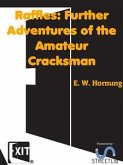I had a thought to call this book Pale Hands or Fair Hands Imbrued—so easy it is to fall into the ghastly error of facetiousness.
Apart, however, from the desire to avoid pedant or puerile humour, re-examination of my material showed me how near I had been to crashing into a pitfall of another sort. Of the ladies with whose encounters with the law I propose to deal several were assoiled of the charges against them. Their hands, then—unless the present ruddying of female fingernails is the revival of an old fashion—were not pink-tipped, save, perhaps, in the way of health; nor imbrued, except in soapsuds. My proposed facetiousness put me in peril of libel.
Interest in the criminous doings of women is so alive and avid among criminological writers that it is hard indeed to find material which has not been dealt with to the point of exhaustion. Does one pick up in a secondhand bookshop a pamphlet giving a verbatim report of a trial in which a woman is the central figure, and does one flatter oneself that the find is unique, and therefore providing of fresh fields, it is almost inevitable that one will discover, or rediscover, that the case has already been put to bed by Mr Roughead in his inimitable manner. What a nose the man has! What noses all these rechauffeurs of crime possess! To use a figure perhaps something unmannerly, the pigs of Perigord, which, one hears, are trained to hunt truffles, have snouts no keener.
Suppose, again, that one proposes to deal with the peccancy of women from the earliest times, it is hard to find a lady, even one whose name has hitherto gleamed lurid in history, to whom some modern writer has not contrived by chapter and verse to apply a coat of whitewash.
Locusta, the poisoner whom Agrippina, wanting to kill the Emperor Claudius by slow degrees, called into service, and whose technique Nero admired so much that he was fain to put her on his pension list, barely escapes the deodorant. Messalina comes up in memory. And then one finds M. Paul Moinet, in his historical essays En Marge de l'histoire, gracefully pleading for the lady as Messaline la calomniee—yes, and making out a good case for her. The Empress Theodora under the pen of a psychological expert becomes nothing more dire than a clever little whore disguised in imperial purple.
On the mention of poison Lucretia Borgia springs to mind. This is the lady of whom Gibbon writes with the following ponderous falsity:
In the next generation the house of Este was sullied by a sanguinary and incestuous race in the nuptials of Alfonso I with Lucretia, a bastard of Alexander VI, the Tiberius of Christian Rome. This modern Lucretia might have assumed with more propriety the name of Messalina, since the woman who can be guilty, who can even be accused, of a criminal intercourse with a father and two brothers must be abandoned to all the licentiousness of a venal love.
Apart, however, from the desire to avoid pedant or puerile humour, re-examination of my material showed me how near I had been to crashing into a pitfall of another sort. Of the ladies with whose encounters with the law I propose to deal several were assoiled of the charges against them. Their hands, then—unless the present ruddying of female fingernails is the revival of an old fashion—were not pink-tipped, save, perhaps, in the way of health; nor imbrued, except in soapsuds. My proposed facetiousness put me in peril of libel.
Interest in the criminous doings of women is so alive and avid among criminological writers that it is hard indeed to find material which has not been dealt with to the point of exhaustion. Does one pick up in a secondhand bookshop a pamphlet giving a verbatim report of a trial in which a woman is the central figure, and does one flatter oneself that the find is unique, and therefore providing of fresh fields, it is almost inevitable that one will discover, or rediscover, that the case has already been put to bed by Mr Roughead in his inimitable manner. What a nose the man has! What noses all these rechauffeurs of crime possess! To use a figure perhaps something unmannerly, the pigs of Perigord, which, one hears, are trained to hunt truffles, have snouts no keener.
Suppose, again, that one proposes to deal with the peccancy of women from the earliest times, it is hard to find a lady, even one whose name has hitherto gleamed lurid in history, to whom some modern writer has not contrived by chapter and verse to apply a coat of whitewash.
Locusta, the poisoner whom Agrippina, wanting to kill the Emperor Claudius by slow degrees, called into service, and whose technique Nero admired so much that he was fain to put her on his pension list, barely escapes the deodorant. Messalina comes up in memory. And then one finds M. Paul Moinet, in his historical essays En Marge de l'histoire, gracefully pleading for the lady as Messaline la calomniee—yes, and making out a good case for her. The Empress Theodora under the pen of a psychological expert becomes nothing more dire than a clever little whore disguised in imperial purple.
On the mention of poison Lucretia Borgia springs to mind. This is the lady of whom Gibbon writes with the following ponderous falsity:
In the next generation the house of Este was sullied by a sanguinary and incestuous race in the nuptials of Alfonso I with Lucretia, a bastard of Alexander VI, the Tiberius of Christian Rome. This modern Lucretia might have assumed with more propriety the name of Messalina, since the woman who can be guilty, who can even be accused, of a criminal intercourse with a father and two brothers must be abandoned to all the licentiousness of a venal love.









